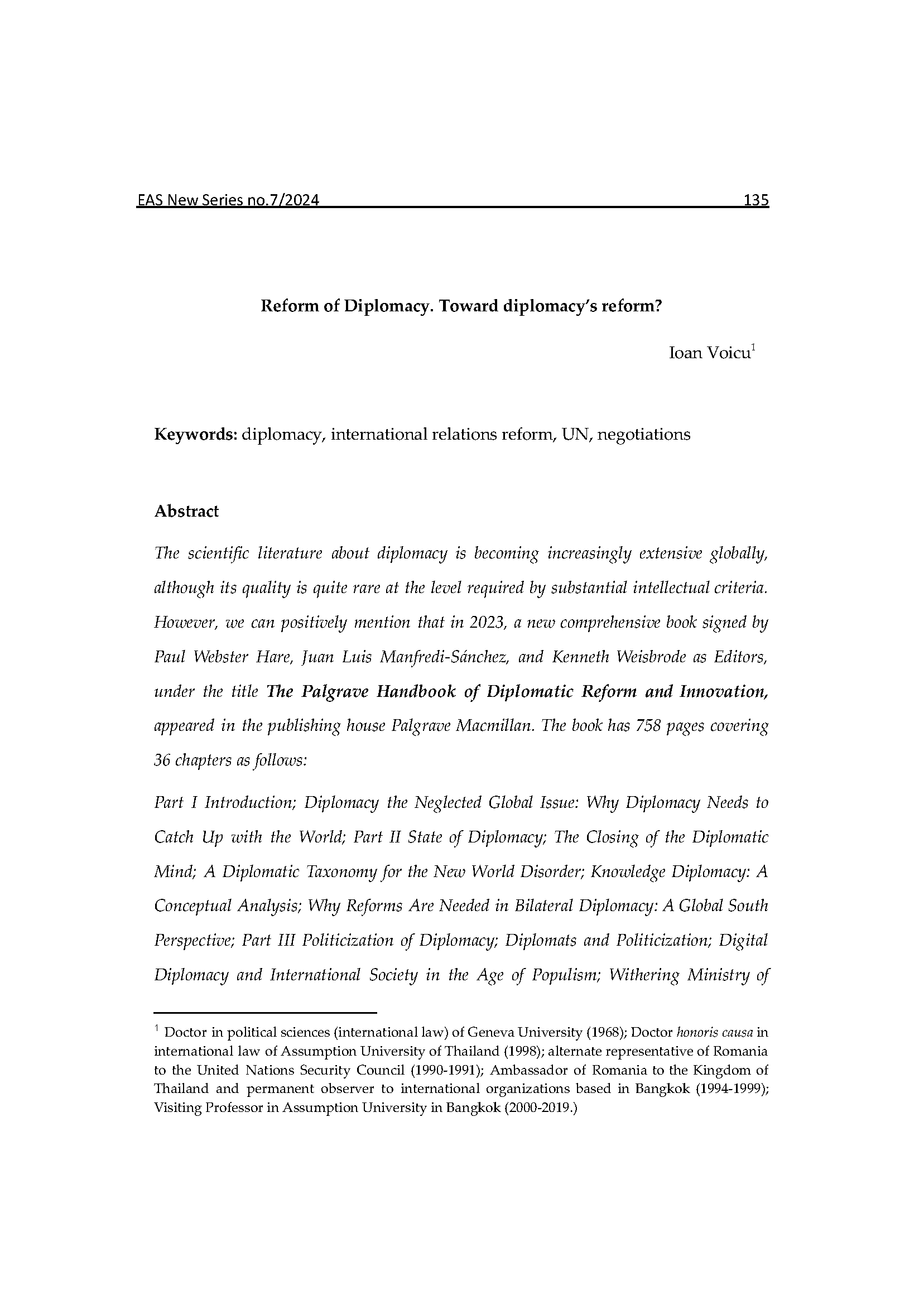Reform of Diplomacy. Toward diplomacy’s reform?
DOI:
https://doi.org/10.31178/eas.2024.7.5Keywords:
diplomacy, international relations reform, UN, negotiationsAbstract
The scientific literature about diplomacy is becoming increasingly extensive globally, although its quality is quite rare at the level required by substantial intellectual criteria. However, we can positively mention that in 2023, a new comprehensive book signed by
Paul Webster Hare, Juan Luis Manfredi-Sánchez, and Kenneth Weisbrode as Editors, under the title The Palgrave Handbook of Diplomatic Reform and Innovation, appeared in the publishing house Palgrave Macmillan. The book has 758 pages covering 36 chapters as follows: Part I Introduction; Diplomacy the Neglected Global Issue: Why Diplomacy Needs to Catch Up with the World; Part II State of Diplomacy; The Closing of the Diplomatic Mind; A Diplomatic Taxonomy for the New World Disorder; Knowledge Diplomacy: A Conceptual Analysis; Why Reforms Are Needed in Bilateral Diplomacy: A Global South Perspective; Part III Politicization of Diplomacy; Diplomats and Politicization; Digital Diplomacy and International Society in the Age of Populism; Withering Ministry of 1 Doctor in political sciences (international law) of Geneva University (1968); Doctor honoris causa in international law of Assumption University of Thailand (1998); alternate representative of Romania to the United Nations Security Council (1990-1991); Ambassador of Romania to the Kingdom of Thailand and permanent observer to international organizations based in Bangkok (1994-1999); Visiting Professor in Assumption University in Bangkok (2000-2019.) EAS New Series no.7/2024 136 Foreign Affairs: Evidence from China; South Africa and its Foreign Alignment and Practice: From Hope to Dashed Expectations; Part IV Reforming Institutions; From Great Expectations to Dwindling Status: Brazilian Diplomacy’s Response to Post-Cold War Upheavals; Crisis Prevention and Stabilization Made in Germany: Meeting the Demands of Modern Diplomacy? Integrated Statecraft and Australia’s Diplomacy; African Union Reform: Challenges and Opportunities; What Motivates South Korea’s Diplomatic Reform and Innovation?The Transformations of French Diplomacy; Part V
Digital Revolution and Diplomatic Reform; Digital Diplomacy in the Time of the Coronavirus Pandemic: Lessons and Recommendations; Exploring the Usefulness of Artificial Intelligence for Diplomatic Negotiations: Two Case Studies; Beyond Meeting and Tweeting: The Next Challenges for Innovation in Diplomacy; Disinformation and Diplomacy; Digitalizing South American MFAs: Reform and esistance; Part VI Multilateral Diplomacy and Innovation; Toward a More Credible Multilateralism at the United Nations: A Few Practical Steps; A New Logic of Multilateralism on Demand; About Spheres of Influence; Regional Diplomacy and Its Variations: Change and
Innovation; Why Collective Diplomacy Needs to Embrace Innovation; Innovating International Cooperation for Development: A New Model for Partnerships Between Developed and Middle-Income Countries; The UAE’s Innovative Diplomacy: How the Abraham Accords Changed (or Did Not Change) Emirati Foreign Policy; Small States: From Intuitive to Smart Diplomacy; Urban Diplomacy: How Cities Will Leverage Multilateralism; Reforming Global Health Diplomacy in the Wake of COVID-19 ; The Reform of Humanitarian Diplomacy; Geoeconomic Diplomacy: Reforming the Instrumentalization of Economic Interdependencies and Power; Science Diplomacy with EAS New Series no.7/2024 137 Diplomatic Relations to Facilitate Common-Interest Building; Climate Diplomacy for a
1.5 Degree World; Global Diplomacy and Multi- stakeholderism: Does the Promise of the 2030 Agenda Hold? Conclusions.
We have enumerated the titles of all the chapters of the book to offer a panoramic view of the whole volume, familiarizing the readers of this article with the integral content of this excellent collective research and underlining the complexity of any serious analysis dedicated to the reform of diplomacy during an era characterized by global vulnerabilities, perplexities, and discontinuities. But how can diplomacy be reformated when it is experiencing a serious crisis, both at the bilateral and multilateral levels, and how can the crisis of diplomacy itself be defined?





